

The Best Time to Buy an Airline Ticket. Market Insights. The BEA's second estimate of real GDP showed the U.S. economy contracted 1.0% q/q saar in the first quarter of 2014, revised from +0.1% and the first negative print since 2011.
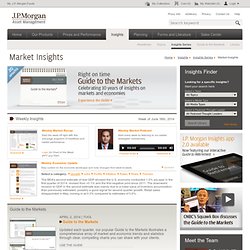
The downward revision to GDP in the second estimate was mainly due to a lower pace of inventory accumulation than previously estimated, possibly a good signal for second quarter growth. Retail sales disappointed in May, coming in at 0.3% compared to estimates of 0.6%. The May employment report was right in line with expectations, showing that non-farm payrolls rose by 217,000 and the unemployment rate held steady at 6.3%. This marks the fourth consecutive month of job gains over 200,000 for the first time since January 2000. The job openings and labor turnover (JOLTS) report showed 4.5 million job openings at the end of April, up slightly from the end of March. Consumer prices were stronger again in April, as headline CPI increased 0.26%. How To Get Rich. I haven’t been posting a lot lately, but in light of the recent activity in the stock markets and the depressing unemployment rates I thought it would be a good time to re-post a blog I wrote almost 3 years ago Thats what so many want.
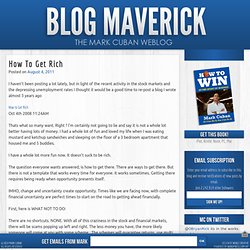
Right ? I’m certainly not going to lie and say it is not a whole lot better having lots of money. I had a whole lot of fun and loved my life when I was eating mustard and ketchup sandwiches and sleeping on the floor of a 3 bedroom apartment that housed me and 5 buddies. I have a whole lot more fun now. The question everyone wants answered, is how to get there.
IMHO, change and uncertainty create opportunity. First, here is WHAT NOT TO DO: How To Budget When You Don't Have a Regular Paycheck. The Multiply-by-25 Rule Shows You How to Start Saving Money. The most frequent question I am asked when giving money management advice is “How do I get started saving money?”
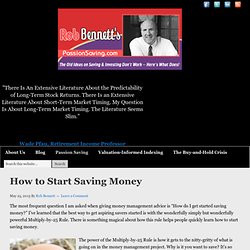
I’ve learned that the best way to get aspiring savers started is with the wonderfully simply but wonderfully powerful Multiply-by-25 Rule. There is something magical about how this rule helps people quickly learn how to start saving money. The power of the Multiply-by-25 Rule is how it gets to the nitty-gritty of what is going on in the money management project.
You have to have a budget. Home | The Financial Page You Need a plan by Keith RawlinsonVolunteer Budget Counselor In finances, plan = budget In order to get ahead, you've got to have a plan.
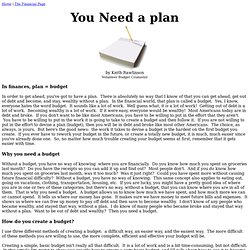
There is absolutely no way that I know of that you can get ahead, get out of debt and become, and stay, wealthy without a plan. Without a budget, you have no way of knowing where you are financially. I use three different methods of creating a budget: a difficult way, an easier way, and the easiest way. Creating a simple, basic budget isn't really all that difficult. The Difficult (and most effective) Way. Step 1: Figure out exactly what your monthly take-home pay is. If you are paid once per week, and your paycheck amounts are always about the same, then just multiply your paycheck amount by four to get your monthly take-home amount.
If you are paid twice per month, then of course you would multiply your paycheck amount by two. If you are paid every two weeks, then it gets a little bit trickier. Finally, the hard part. 10 Ways to Simplify Your Budget. Every Tuesday is Finance & Family Day at Zen Habits. I’m always looking for ways to simplify my finances (I’m weird like that, I know), and recently I’ve been scrutinizing my already-simple budget to make it even simpler.
I thought it would be helpful to share some of the ways to make your budget as simple as possible. The goal is to reduce headaches, eliminate the need for complicated tracking schemes, and reduce the time you spend on your budget and finances to about 15-20 minutes per week. I can’t claim these ideas are original, or that I haven’t discussed them in various places before, but in my experience, they work. They’re simple and powerful. How to never have a car payment again. Home | The Financial Page How To Never Have A Car Payment Again by Keith Rawlinson Volunteer Budget Counselor You're always going to have a car payment, right?
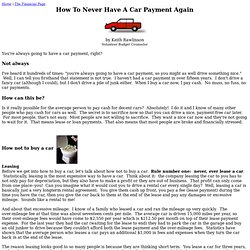
Not always I've heard it hundreds of times: "you're always going to have a car payment, so you might as well drive something nice. " Is it really possible for the average person to pay cash for decent cars? How not to buy a car Leasing Before we get into how to buy a car, let's talk about how not to buy a car. And about that excessive mileage: I know of a family who leased a car and ran the mileage up very quickly. The reason leasing looks good to so many people is because they are thinking short term. If we lease: We have a lease payment of say $350 per month. If we buy: We can reasonably assume a payment of somewhere around $400 per month.
In this example, in nine years we have paid $9,800 more to lease a car than to buy one. In the above example, I tried to use realistic numbers.